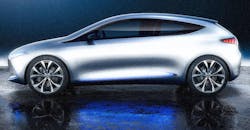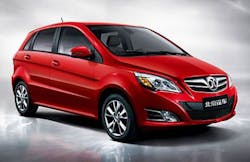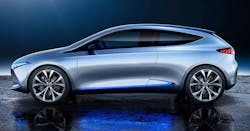After more than 100 years of reliance on the internal combustion engine, the production and sale of cars that run exclusively on gasoline or diesel fuel may be coming to an end before this century is half over.
This past weekend, China—the world's biggest vehicle producer and manufacturer, selling more than 28 million vehicles in 2016—became the third (and largest) country to consider eliminating combustion-engine cars. At a forum on automotive industry development Xin Guobin, vice minister of industry and information, said that the country had started research on a timetable to phase out production and sales of fossil fueled cars. China’s Ministry of Industry and Information Technology (MIIT) will work out the timetable, Xin said.
An estimated 500,000 “new energy vehicles”—the vast majority of them EVs—were built and sold last year in China, with the electric car market led by companies such as BYD Co. and BAIC Motor Corp.
The world’s second-biggest economy, which has vowed to cap its carbon emissions by 2030 and curb worsening air pollution, thus joins the U.K. and France in seeking to phase out vehicles using gasoline and diesel fuel. Over a two-week period in July, first the French and then the British announced plans to ban sales of gasoline and diesel powered vehicles by 2040. Neither government indicated whether the ban would include hybrid electric cars which do have a combustion engine either for supplemental motive power or to generate electricity.
According to the U.K.’s environment minister, Nicolas Hulot, the country plans to invest more than ₤800 million ($1 billion) in driverless and zero-emission technology and expects to invest ₤246 million $326 million) in battery technology research. At present, according to Mike Hawes, chief executive of the U.K.’s Society of Motor Manufacturers and Traders, there are only 12,000 public charging points in Britain.
Separately, Sweden’s Volvo Car Group has said that starting in 2019, it will no longer launch new car models powered only by internal combustion engines. Looking to zero-emission electric cars to help clean up smog-choked major cities the mayors of Athens, Madrid, Mexico City, and Paris also have stated they plan to ban diesel vehicles from city centers by 2025.
At the just-opened Frankfurt Motor Show, Volkswagen AG, the world’s largest car company, showed off a new version of its electric ID Crozz crossover SUV concept vehicle. It will have a battery range of about 310 to 370 miles (based on European standards; measured by U.S. standards its stated range will be somewhat lower). “We will be thoroughly updating our vehicle range by 2020 and expanding into important segments,” said Dr. Herbert Diess, chairman of the Brand Board of Management Volkswagen Passenger Cars. “In 2025 Volkswagen Brand will already be offering 23 all-electric models and [we will] invest €6 billion in electric mobility over the next five years.”
At the Frankfurt event, Daimler AG’s Mercedes-Benz has unveiled a compact electric vehicle under its EQ sub-brand . The EQA has two electric motors that can give it different driving characteristics depending on which mode the driver chooses. The Stuttgart-based automaker also revealed a “pre-production” model of a battery-fuel cell hybrid SUV, designated the GLC F-Cell, that can run on hydrogen and emit only water vapor.
Audi, for its part, showcased the Aicon at Frankfurt, an autonomous EV concept vehicle with a projected range up to 800 kilometers (497 miles). Its interior features include swivel chairs that lean back and have integrated touch controls.



